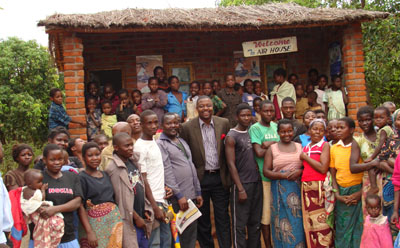After The Boy Who Harnessed the Wind, the autobiography of ingenious 22-year-old William Kamkwamba’s homemade electric windmill in Malawi, comes “the boy who harnessed the airwaves” by building a radio station with rudimentary materials. The tale of 21-year-old Malawian Gabriel Kondesi also showcases the inventiveness spawned by life in this impoverished, landlocked nation in southeastern Africa. Unlike the story of Kamkwamba, though, Kondesi’s tale is still unfolding.
Kondesi constructed the station himself three years ago, using, among other things, three small transistor radios, car batteries, TV aerials, wires, and a radio cassette player. The structure itself is noted for its brick walls, grass roof, and relatively high foundation. The height of the foundation, intended to aid in the transmission, also gave the station its name: Pachikweza, meaning something very high in the local Chichewa language. The station was built with care. “What struck me was the way he treated the walls to make sure acoustics were right so he couldn’t experience echoes,” said Gospel Kazako, managing director of the Zodiak Broadcasting Station, a prominent Malawian private network, who visited the station.
Once Pachikweza was in full operation, it broadcast at 105.1 FM within a radius of about 25 kilometers in the densely populated Mulanje district of southern Malawi. Kondesi employed a Nokia cell phone so that listeners could phone in. Because his village of Soza has no electricity, he walked to an out-of-town barbershop to recharge the cell phone and the car battery that powered the station. The station had a volunteer staff of about 10, each of whom took three-hour shifts. “We used to have a lot of jokes. We also used to have news coming from neighboring villages,” Kondesi said.
But not everyone was pleased and, for that reason, Pachikweza is now off the air. Kelton Massangano, acting director of broadcasting of the Malawi Communications Regulatory Authority or MACRA, told CPJ in October that Kondesi had been arrested for broadcasting without a license.
“Local police in his neighborhood heard the broadcast in October and that was what prompted his arrest,” Massangano said. “There was no specific incident that initiated the closing of his station; we simply were not aware of its existence and so had taken no previous action.”
There are 23 radio stations currently operating in Malawi, according to the Media Institute of Southern Africa. Malawi liberalized the use of its public airwaves after holding its first multiparty elections in 1994, but license applications were not accepted until 1998. Even now, the government accepts applications only during occasional, announced periods, according to Zadziko Mankhambo, a MACRA spokesman. A successful applicant must have a business plan and pay a yearly installment of 29,000 kwacha (US$200) over seven years. Local journalists have complained that political interference has tainted the process, and the government has often imposed censorship, and carried out arrests and closures of stations over political coverage, particularly during election cycles, according to CPJ research.
Kondesi gathered information to apply for a license two years ago but was told to wait for MACRA’s next call for applications. Operating without one, he was subject to penalty. Arrested in mid-October, he faced a hard choice: Pay a fine of 50,000 kwacha (US$350), an extremely high amount in Malawi, or go to prison for 10 months. He spent only a night in prison before family, neighbors, friends and fans of his radio station pooled their limited resources to pay the fine.
Kondesi’s case has generated national headlines, and a Facebook support group counts some 475 members. He was also offered a scholarship to Kaphuka Private Secondary School in the commercial city of Blantyre and began attending classes this month. In the days after his release, he met with MACRA officials to discuss potential options for acquiring a license so that he could reopen his station. However, no concrete decisions have been made regarding this matter, according to Mankhambo.
Kondesi’s story highlights the importance of radio in small communities in Africa. “I found out that so many people were looking up to me,” he said. “The people of the village expect me to continue broadcasting to them because I used to give them the opportunity to express themselves. Everybody’s expecting a lot from me so I will continue to be a radio broadcaster.”
Mohamed Keita is CPJ’s Africa research associate. Caitlin Clarke is a CPJ consultant.
